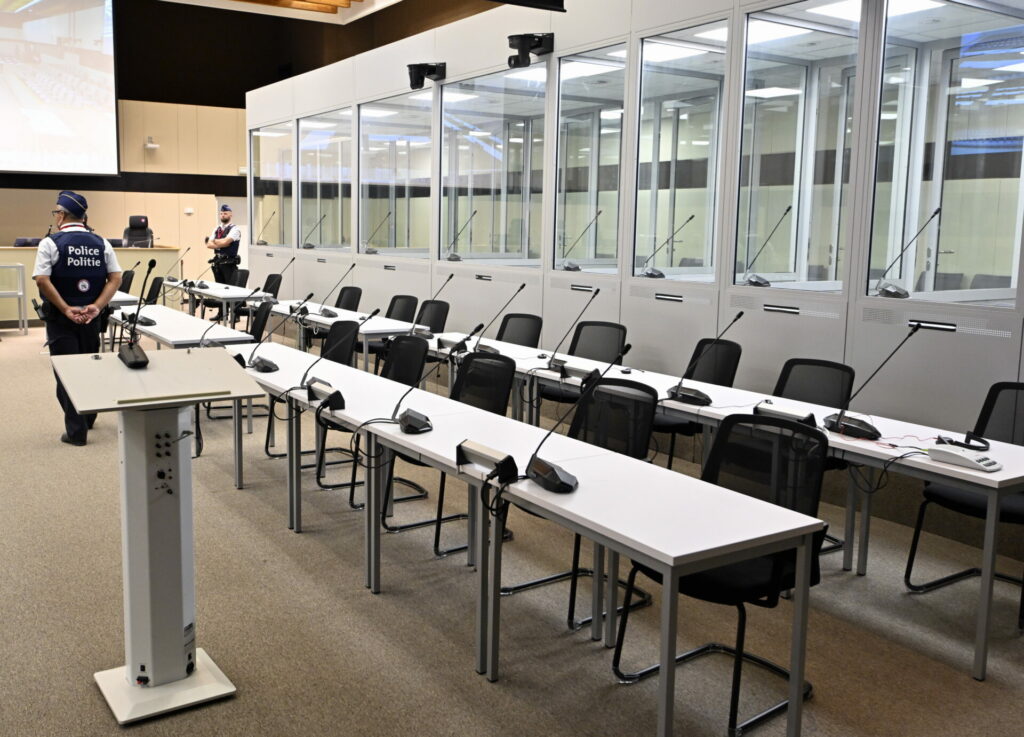The roles of Hervé Bayingana Muhirwa, Ibrahim Farisi and Sofien Ayari will be explained on Tuesday at the assize court charged with trying the men accused of involvement in the 22 March 2016 Brussels terror attacks.
Investigators are also slowly approaching the end of the review of the ‘entities’ – the suicide bombers and the defendants – involved in the attacks.
Hervé Bayingana Muhirwa, born in Rwanda in 1985, spent his childhood there. His father died in 1990, “assassinated by the people in power,” according to the accused. The family then fled the country.
Hervé Bayingana Muhirwa
Muhirwa eventually arrived in Belgium in 1998, at the age of 13, and obtained Belgian nationality in October 2001.
In March 2011, the accused converted to Islam, and in 2012, he met Najim Laachraoui, one of the two airport suicide bombers, with whom he had several mutual friends, and who would eventually leave for Syria, just like Bilal El Makhoukhi.
In November 2013, El Makhoukhi returned to Belgium and Hervé Bayingana Muhirwa drove him several times to the Antwerp Correctional Court, where he was on trial in the Sharia4Belgium case.
In January 2016, he landed a job as a night manager in a Red Cross asylum seekers’ centre, a social job he found rewarding and enjoyed.
The defendant went on to host members of the terrorist cell at his home in Tivoli Street in Laeken on several occasions before and after the attacks.
Finally arrested in the company of another defendant, Osama Krayem, on 8 April 2016, he is accused of providing “indispensable” logistical assistance in the attacks.
Ibrahim Farisi
After the portrait of Hervé Bayingana Muhirwa, the investigators will draw up a portrait of Ibrahim Farisi, who, on the day after the attacks, went to empty the flat on the Avenue des Casernes with his brother, who was subletting it to the terrorists.
His brother used a backpack that looked like the one carried by Osama Krayem on the morning of 22 March before deciding not to blow himself up. That backpack was never found.
The Farisi brothers returned to the flat on the Avenue des Casernes on 25 March to remove the last items.
Arrested in April 2016, Ibrahim Farisi was conditionally released the following 16 November. He was then hired by the Anderlecht Public Social Service Centre as a mediator at the reception service.
He is the only one of the ten defendants to be prosecuted only for participation in the activities of a terrorist group, and not for murder and attempted murder committed in a terrorist context like the other nine, including his brother Smail.
If the timing allows, Tuesday will end with the presentation on Sofien Ayari, who was arrested at the same time as Salah Abdeslam, on 18 March 2016, in Molenbeek-Saint-Jean, four days before the attacks.
Sofien Ayari, radicalised in 2013
The Tunisian, who grew up in a family of four children, allegedly began to be radicalised in 2013, and his family noticed a change in his behaviour. In December 2014, he left Tunisia to travel to Syria.
After being injured in Syria, Sofien Ayari left the country in mid-September 2015, along with Osama Krayem. Salah Abdeslam picked up the two men in Ulm, Germany, in early October 2015, and brought them back to Belgium.
He was later to be found in several hideouts of the cells responsible for the attacks in Paris and Brussels. One of these was the residence in Rue du Dries in Forest, where a shooting occurred on 15 March 2016. During that shootout, he fled with Salah Abdeslam.
Sofien Ayari was arrested on 18 March, together with Salah Abdeslam, in Molenbeek-Saint-Jean. Both claimed to have no knowledge of the attacks that were to be carried out in Brussels a few days later.

